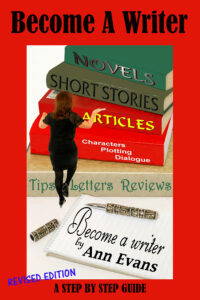Hints And Tips For New Writers #2
27 May 2020

“We must walk before we run,” is a well-known phrase attributed, according to Google, to English novelist and travel book writer, George Henry Borrow.
I wish I could say that I’ve always been a firm believer in that idea because it is something of a golden rule. But of course, rules are made to be broken, and when I was a new, unpublished writer I was trying to run marathons before I could even walk without stumbling – metaphorically speaking, that is.
I’m sure many novice writers are beavering away on novels and sagas when they haven’t yet had the shortest of stories published. But you can’t knock anyone’s enthusiasm for writing – and from my own experience, having been inspired as a young unpublished writer by Mills & Boon author Mary Wibberley, I was eager to write my own romantic novel.
Unfortunately, I hadn’t mastered the basic skills of writing fiction and I suppose I was too wrapped up in my tale of love , passion and betrayal to pay much attention to getting the punctuation around dialogue correct, or cutting back on those adverbs after speech tags, or learning that viewpoint was totally different from point of view – and a dozen other rules of writing.
So mistakes were repeated time and again throughout those early days and perhaps if I’d got the hang of those basic aspects of writing earlier, success may have arrived a little sooner.
The problem is, it’s so easy to keep on making the same mistakes simply because we don’t recognise them as errors. It’s only when someone more experienced takes the trouble to point out your mistakes that you can see them for yourself. Reading ‘how to’ books and blogs helps immensely, as does finding a good local writing class or a mentor.
You might think that it’s okay to let little errors slip through in your manuscript, believing that as the majority of your story is so good the editor won’t mind putting any punctuation or spelling mistakes right. When in fact, it’s so important to get your work as word perfect as you can possibly make it before sending it off.
Writing for publication is a professional business and the novice writer is up against experienced, professional writers – in all genres, not just romance, so it’s vital that the novice gives themselves the very best chance possible.
Imagine – if an editor has space for only one short story in their magazine, and there’s two good ones to choose from, are they more likely to use the one that doesn’t need a whole lot of editing or the one littered with typos and errors? If you were that editor which would you choose?
I’ve put together a short list of some of the ‘basic errors’ that novice writers – and the not so novice, sometimes make in their writing:
- Ensure the punctuation around dialogue is correct. As an exercise, copy type a published extract.
- Understand that attributions to the dialogue aren’t capitalised, even after question marks and exclamation marks, e.g. “Are you sure?” he asked.
- Avoid the pattern: speech tag, adverb. e.g. “Darling, will you marry me?” he asked lovingly. “Of course, John,” she answered happily.
- Avoid using weird attributions which draw attention to themselves rather than what’s being said, e.g. “Fine, we’ll do it your way,” Mike promulgated, folding his arms.
- He said and she said are virtually invisible – unless you use them too frequently. You would also add an appendage comma after the attribution, e.g. “Who’s that?” she cried, spinning around.
- Vary the narrative around dialogue; have your characters doing something before or after speaking so there’s no need for an attribution at all.
- Understand viewpoint. Know who your viewpoint character is and stick with them. Don’t go jumping into another character’s head or heart. Your viewpoint character can’t know what another character is thinking or feeling. Avoid head-hopping.
- It’s absolutely fine and often necessary to have more than one viewpoint character but give them their own space – their own chapters or scenes where we get to see what they are thinking and feeling.
- Understand what show don’t tell really means. Know when you’ve slipped from writing the narrative to telling. It can be a fine line, so think of the expression: ‘too much information!’ If you find yourself providing too much information for the reader’s benefit, then you are probably telling. So find other ways of getting the necessary information across to the reader without blatantly telling them.
- Watch out for superfluous words and long-winded sentences. Make every word earn its place in your story. If you think a sentence is too wordy, find a way to rephrase it but always listen to the euphony – the rhythm and flow of your writing.
- Be aware of repetition. It’s so easy to use the same word too often; or start sentences the same way. This is definitely something to pay attention to when editing.
These are just basic elements to writing, and once these are second nature, you’ll be up and running and well on your way to successfully reaching your goal.
Stay safe and happy writing everyone.
Ann

Ann Evans writes romance under the name of Ann Carroll, she also writes thrillers, books for children, YA and reluctant readers. She is also a freelance feature writer for various magazines.
Website: www.annevansbooks.co.uk
Facebook: https://www.facebook.com/annevansbooks/
Twitter: https://twitter.com/annevansauthor

Find more writing tips in Ann Evans’ book, Become a Writer – a step by step guide.
https://amzn.to/3487fws



